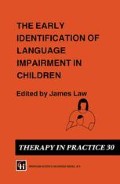Abstract
In Chapter 1 reference was made to Gardner’s (1983) theory of multiple intelligences. This suggests that there is a variety of intelligences — musical, linguistic, logical-mathematic, spatial and bodily-kinesthetic. But these intelligences are not necessarily equally weighted. Leonard (1987) compares the way in which Western society views language with the way it sees music. Children differ in their musical ability much as they differ in their ability to use language. Yet we do not speak of children being musically delayed and we do not generally refer children who do not meet our musical expectations for remediation. In essence, language is a species-specific domain of intelligence which carries the greatest weight of all the intelligences in our society. Accordingly children who experience difficulties acquiring the skills of language are greatly disadvantaged in the first instance and, as we have seen in Chapter 2, many go on to experience pervasive schooling problems and consequent emotional difficulties.
Access this chapter
Tax calculation will be finalised at checkout
Purchases are for personal use only
Preview
Unable to display preview. Download preview PDF.
References
Bradley, L. and Bryant, P. (1985) Rhyme and Reason in Reading and Spelling, University of Michigan Press, Ann Arbor.
Gardner, H. (1983) Frames of Mind: The Theory of Multiple Intelligence, Basic Books, New York.
Illich, I. (1975) Medical Nemesis: The Expropriation of Health, Calder and Boyars, London.
Law, J. (1990) Two videos — ‘Growing up Talking’ and ‘Trouble Talking’, available from Healthcare Productions, 116 Cleveland Street, London W1P 5DN.
Law, J. (1991) How are we screening our children? Speech Therapy in Practice, 7(1), 16–17.
Leonard, L. (1987) Is specific language impairment a useful construct? In Advances in applied psycholinguistics (vol I), (ed. S. Rosenberg), Laurence Erlbaum, Hillsdale NJ, 1–39.
Marteau, T. (1989) The psychological costs of screening. British Medical Journal, 299, 527.
Melhuish, E. C. and Moss, P. (eds) (1990) Day Care for Young Children: International Perspectives, Routledge, London.
Robinson, R. (in press) Brain Imaging and Language in Specific Speech and Language Disorders in Children, Whurr Publications, London.
Editor information
Editors and Affiliations
Rights and permissions
Copyright information
© 1992 Springer Science+Business Media Dordrecht
About this chapter
Cite this chapter
Law, J. (1992). Early identification — a question of science or politics?. In: Law, J. (eds) The Early Identification of Language Impairment in Children. Therapy in Practice Series, vol 30. Springer, Boston, MA. https://doi.org/10.1007/978-1-4899-4445-0_9
Download citation
DOI: https://doi.org/10.1007/978-1-4899-4445-0_9
Publisher Name: Springer, Boston, MA
Print ISBN: 978-0-412-39340-2
Online ISBN: 978-1-4899-4445-0
eBook Packages: Springer Book Archive

